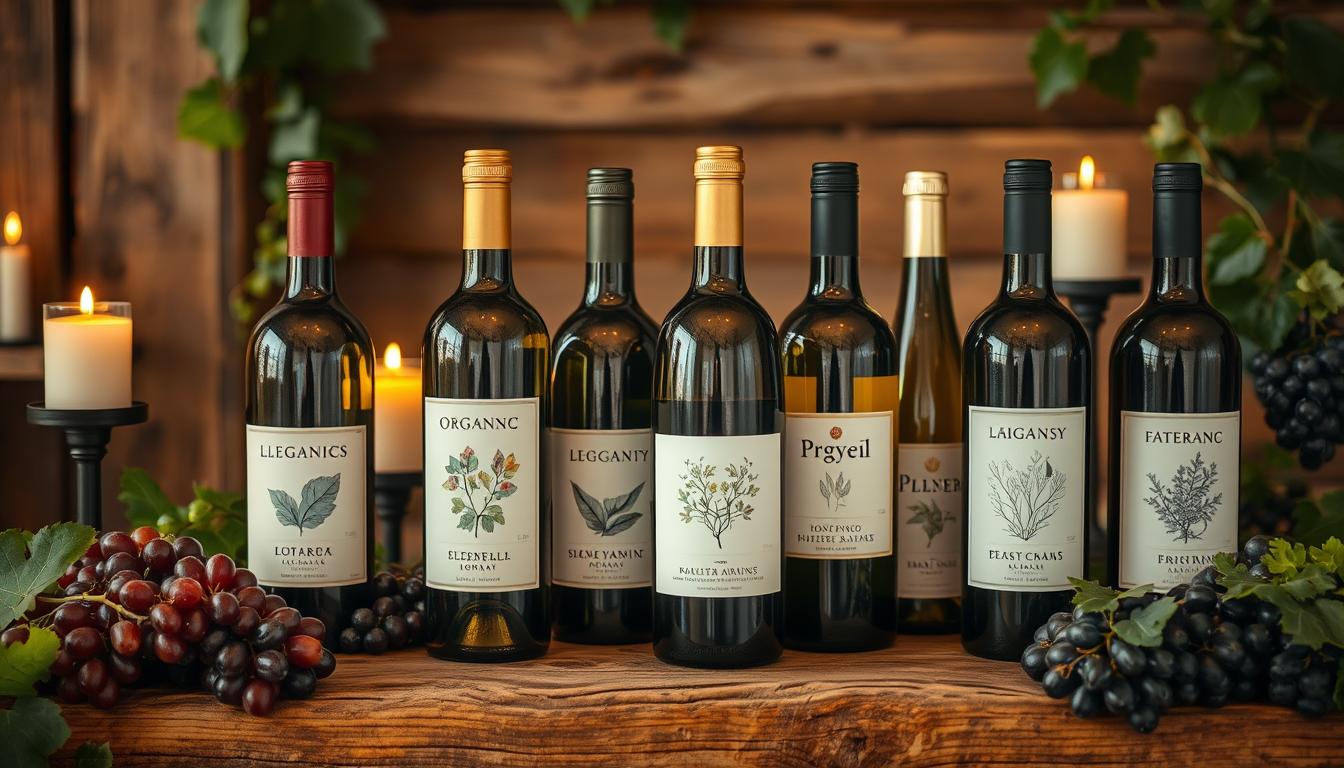Have you ever taken a sip of wine and felt a rush of connection with the earth? When you choose organic wine, you’re inviting a story into your glass—one that speaks of sustainable viticulture and the passionate care of the land. Imagine savoring a red or white crafted from grapes that thrive apart from synthetic pesticides and harmful chemicals. This choice not only tantalizes your palate but also contributes to a healthier planet. As you embark on this flavorful journey, you become part of a movement that celebrates eco-friendly winemaking and supports agriculture that honors both nature and our future. As you swirl and sip your glass of organic wine, you can truly appreciate the dedication of the winemakers to preserving the environment and producing a product that is not only delicious but also sustainable. The rich, complex flavors and aromas of the wine will transport you to the vineyards where the grapes were grown with the utmost care and respect for the land. This red wine tasting experience becomes more than just a leisurely activity – it becomes a celebration of the harmony between nature and human ingenuity. Cheers to a glass of organic wine that embodies the beauty and integrity of eco-friendly winemaking.
Key Takeaways
- Organic wines must be made with 95% organically produced ingredients.
- Wines labeled “made with organic grapes” exclude toxic pesticides and synthetic fertilizers.
- Organic wines can contain under 10 ppm of naturally occurring sulfites.
- Certification guarantees that these wines define a commitment to environmental sustainability.
- Choosing organic wines supports eco-conscious farming and enhances your overall drinking experience.
What is Organic Wine?
Organic wine represents a growing movement in the wine industry, focusing on environmentally friendly practices and healthier choices for consumers. You may wonder what distinguishes organic wine from its conventional counterparts, and this section unpacks those details.
Defining Organic Wine
Organic wine is crafted from organically grown grapes, which means the vineyard uses sustainable practices that eliminate toxic pesticides, GMOs, and synthetic fertilizers. In the United States, organic wine is required to be made from at least 95% organic ingredients, primarily focusing on organic grapes. It is essential to note that while certified organic wine limits additives, European and Canadian standards are somewhat more lenient, allowing for certain sulfites in organic wines. This emphasizes the emphasis placed on keeping winemaking natural and true to its roots.
Difference Between Organic and Conventional Wine
The differences between organic wine and conventional wine extend beyond the growing practices. In conventional vineyards, over 30 different chemicals are often employed, which have severe consequences for local ecosystems and water sources. Reports indicate that ground water contamination is a significant threat associated with conventional wine production. On the other hand, organic wines are produced under stringent certification programs like Sip Certified and USDA National Organic Program, ensuring compliance with sustainable practices.
The journey of organic grape growing may present challenges, such as requiring a minimum distance from neighboring non-organic vineyards during organic audits, aiming to minimize contamination risks. Despite these challenges, many vineyards, like Sokol Blosser Winery, emphasize how organic farming cultivates not just grapes, but a vibrant vineyard environment, showcasing commitment to land stewardship.
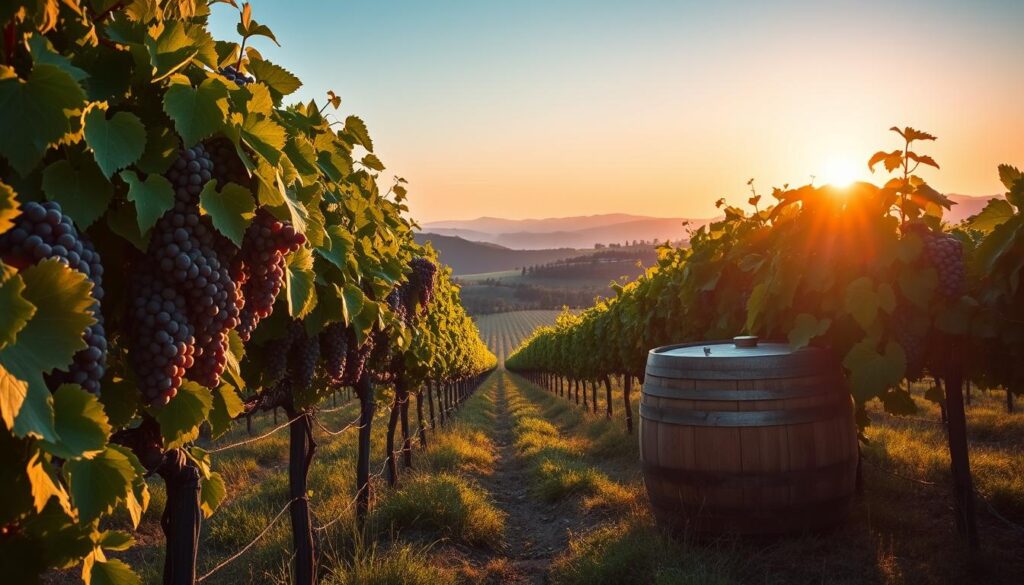
| Aspect | Organic Wine | Conventional Wine |
|---|---|---|
| Grapes | 100% Organic Grapes | Can contain synthetic chemicals |
| Additives | No toxic pesticides or herbicides | May use various additives |
| Certification | USDA National Organic Program, Sip Certified | Varies, often no organic certification |
| Environmental Impact | Supports biodiversity and soil health | Can lead to ground water contamination |
Sustainable Viticulture Practices
Sustainable viticulture practices have gained significant attention in recent years, reflecting a shift towards more eco-friendly approaches in winemaking. This form of agriculture emphasizes an ecological balance, minimizing chemical usage while promoting long-term viability in wine production. You might wonder how these methods specifically contribute to the quality and sustainability of organic wines.
Importance of Sustainable Farming
Sustainable farming plays a crucial role in fostering healthier ecosystems and addressing environmental concerns. By reducing harmful impacts through organic vineyard practices, wineries can enjoy numerous benefits. Some key aspects include:
- Minimizing the use of chemical pesticides and fertilizers, enhancing both environmental and health benefits.
- Reducing environmental pollution by up to 50% when compared to conventional methods.
- Encouraging biodiversity, which has been reported to be up to 30% higher in organic vineyards.
- Enhancing soil health, a vital factor affecting the chemical composition of the grapes.
- Generating economic advantages, as organic wines can command prices on average 20% higher than their conventional counterparts.
How Organic Vineyard Practices Contribute to Sustainability
Organic vineyard practices serve as a cornerstone for sustainable viticulture. Techniques such as crop rotation, composting, and integrated pest management not only improve soil health but also support eco-friendly winemaking. In fact, vineyards implementing these practices experience less soil degradation, with studies indicating 40% fewer instances over time.
The demand for organic and sustainable wines is on the rise, with a growth rate of approximately 10% annually. Various certification programs, including SIP Certification and Napa Green, highlight the industry’s commitment to sustainability standards. Furthermore, the adoption of ISO 14001 certification in viticulture demonstrates effective environmental management. Notable wineries, such as Cono Sur in Chile, succeed in this space by showcasing their biodynamic wines, focusing on creating self-sustaining ecosystems.
Ultimately, as more consumers prioritize sustainability and healthier planet initiatives, the popularity of organic wines continues to soar. Embracing these sustainable viticulture practices not only yields better grapes and wine but contributes significantly to a healthier environment.

The Benefits of Organic Wine
Exploring the benefits of organic wine reveals a wealth of advantages for both your health and the environment. Choosing organic wine means you’re making decisions that not only enrich your drinking experience but also support sustainable farming practices that contribute positively to our planet.
Health Benefits of Choosing Organic
Organic wine offers remarkable health benefits that make it a preferred choice for many. The primary reason stems from its production methods, which eliminate harmful chemicals and additives common in conventional wines. Studies highlight that resveratrol, a potent antioxidant prominent in grape skin, plays a key role in the health benefits of organic wine. It promotes increased longevity and offers protection against age-related diseases.
- Resveratrol has been linked to enhanced brain health, reducing the risk of Alzheimer’s and dementia.
- A study involving 5,500 light to moderate drinkers indicated that consuming two to seven glasses of wine weekly correlates with lower chances of depression.
- Organic wine can improve skin health, aiding in preventing aging and boosting circulation.
- The high antioxidant content in organic wine may also help in boosting immunity, offering a protective advantage when combined with vaccinations.
Environmental Impact of Organic Winemaking
The environmental impact of organic winemaking is significantly more favorable compared to conventional practices. Organic vineyards avoid synthetic chemicals, which not only helps preserve local ecosystems but also promotes biodiversity. A recent report indicated that organic grape production has surged by 120%, reflecting a growing commitment to sustainable farming.
| Aspect | Conventional Wine | Organic Wine |
|---|---|---|
| Added Ingredients | Up to 70 | None |
| Sulphur Dioxide Content | Standard levels | Half the amount |
| Resveratrol Levels | Standard | 80% higher |
Choosing organic wine not only enhances your palate with richer, more complex flavors but also aligns with practices that support healthier soil and cleaner water sources. The commitment to sustainable farming promotes a healthier environment for future generations.

Understanding Natural Wine
Natural wine represents a unique approach within the wine industry, distinguished by specific characteristics that set it apart from other types, particularly organic wine. This category thrives on minimal intervention in winemaking. Many enthusiasts appreciate the often spontaneous fermentation processes and distinctive flavor profiles that natural wines can showcase. Familiarizing yourself with the nuances of natural wine will enhance your tasting experience.
Characteristics of Natural Wine
When exploring natural wine, you’ll notice several defining features:
- Minimal additives: Natural wine generally avoids sulfites and other chemicals, resulting in a purer expression of the grape.
- Unique flavors: Each bottling often varies significantly from year to year, emphasizing a strong sense of terroir.
- Hazy appearance: You might find that many natural wines appear cloudy, with settled grape solids often visible at the bottom of the bottle.
- Limited filtering and fining: This process often leaves natural wines with a more authentic texture and complexity.
- Sulfite levels: Natural wines can contain no or low sulfites, typically ranging from 10 to 100 parts per million, compared to the 350 ppm permitted in conventional wines.
How Natural Wine Differs from Organic Wine
Understanding how natural wine differs from organic wine enhances your knowledge of these distinct categories:
| Aspect | Natural Wine | Organic Wine |
|---|---|---|
| Certification | No official certifying body exists for natural wine | USDA and EU certifications available |
| Additives | Generally free of additives, including sulfites | May contain sulfites, with allowances up to 100 mg/L |
| Production methods | Focus on minimal intervention, spontaneous fermentation | Follows specific agricultural methods, including organic farming |
| Flavor profile | Highly variable, with emphasis on terroir | More consistent, following established winemaking practices |
This examination of how natural wine differs from organic wine reveals the broader spectrum of choices within the wine world. Whether you lean toward the unpredictability of natural wine or appreciate the defined regulations surrounding organic wine, understanding these categories truly enriches your journey into the realm of fine wines.
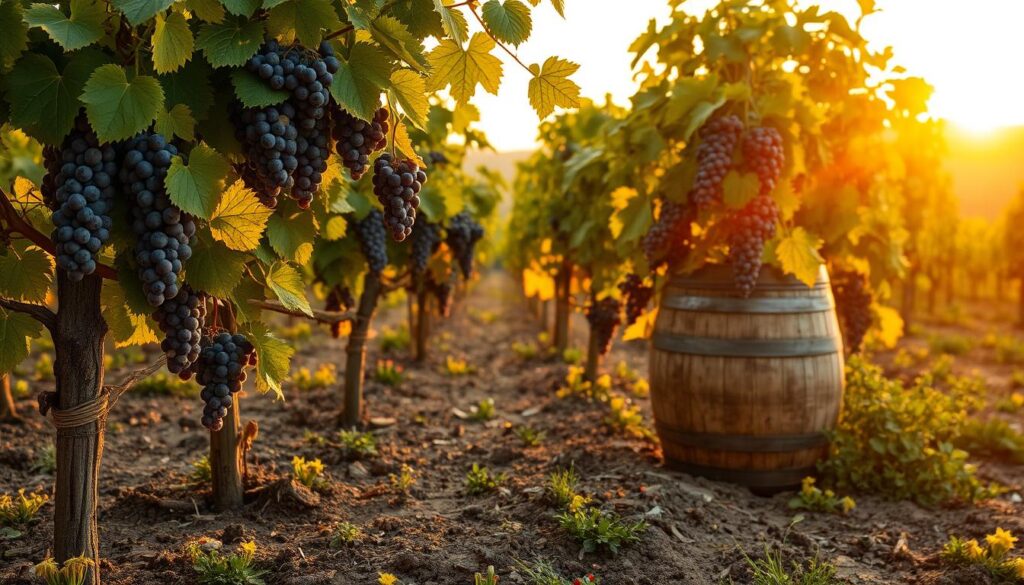
Exploring Biodynamic Farming
Biodynamic farming represents an innovative approach that transcends organic farming practices. This philosophy integrates ecological and spiritual principles into vineyard management. By focusing on creating healthy ecosystems, biodynamic farming emphasizes the interconnectedness of all living things, enhancing soil health and grape quality. Numerous wineries are adopting these practices, showing a growing interest in biodynamic wines.
Principles of Biodynamic Farming
The essence of biodynamic farming involves several core principles:
- Understanding Cosmic Rhythms: Biodynamic farmers align their planting and harvesting schedules with astronomical timings, believing this enhances growth and vitality.
- Soil Health: Practices such as composting and crop rotation are employed to improve soil structure and fertility.
- Biodiversity: Biodynamic farming encourages diverse ecosystems, promoting beneficial insects and wildlife.
- Minimal Intervention: The focus lies on low-intervention winemaking, allowing grapes to express their true terroir.
Certification Process for Biodynamic Wines
Biodynamic certification, overseen by organizations like the Demeter Association, requires adherence to stringent guidelines. These standards include:
- Using no synthetic pesticides, herbicides, or fertilizers, which are commonly used in conventional farming.
- Maintaining a minimum percentage of biodynamic practices, with many growers achieving over 90% compliance.
- Proven connections to holistic farming practices that enrich not only soil but also biodiversity.
Among the wineries represented by Vinifera, many follow sustainable and biodynamic practices, highlighting the commitment to quality and environmental stewardship in winemaking.
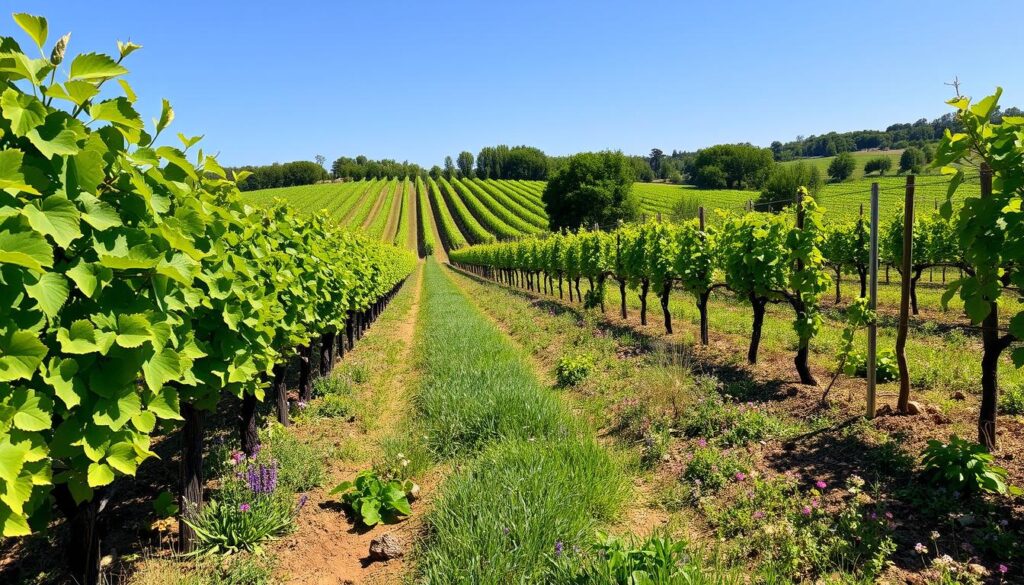
| Wineries | Biodynamic Practices | Organic Farming Since | Certification Type |
|---|---|---|---|
| Cakebread Cellars | Selected vineyard acreage | 2008 | Napa Green Certified |
| Grgich Hills Estate | Regenerative organic practices | N/A | Certified Regenerative Organic |
| Robert Mondavi Winery | All vineyards | N/A | Organic Certified |
| Spring Mountain Vineyard | Organic practices | 1981 | USDA Organic |
| Trefethen Family Vineyards | Biodynamic and organic practices | N/A | Certified California Sustainable |
This commitment not only adheres to biodynamic certification but also contributes to the broader goal of sustainable winemaking, encouraging biodiversity and enhancing the expression of terroir. By embracing biodynamic farming, you can support wines that reflect deep connections between vines, land, and the environment.
Popular Organic Wine Varieties
When exploring the world of organic wine varieties, you will encounter a delightful range of options that highlight the best organic wines available today. From familiar favorites to unique selections, there’s always something new to discover in organic wines. Here, we focus on types of organic wines you should try and recommend specific bottles based on distinct regions.
Types of Organic Wines You Should Try
Organic wine varieties offer an incredible array of flavors and characteristics. Here are some noteworthy types to explore:
- Cabernet Sauvignon: A quintessential red that often carries rich, bold flavors.
- Merlot: Known for its smooth texture and fruit-forward profile.
- Pinot Noir: Celebrated for its elegance and complexity, making it a favorite among wine enthusiasts.
- Petite Sirah: A lesser-known varietal, it packs a punch with deep colors and full-bodied flavor.
- Grenache: A versatile grape often found in blends and famous for its berry flavors.
Region-Specific Organic Wine Recommendations
The best organic wines can often be found in esteemed wine regions across the globe. Consider these outstanding organic options tailored to specific locations:
| Wine | Region | Price | Notes |
|---|---|---|---|
| 2020 Martorana Family Winery Petite Sirah | Dry Creek Valley, CA | 94+ Points | Rich and full-bodied with dark fruit notes. |
| 2021 Obvious Wines No. 6 Simply Rosé | California | Moderate | Light and refreshing with floral undertones. |
| 2018 Horse & Plow Grenache | Napa Valley, CA | Bulk Buy | Classic organic option at an accessible price. |
| Domaine Bousquet Gaia Organic Malbec | Argentina | Affordable | Delicious organic red with dark fruit character. |
| Alavida Organic Kosher Malbec | Argentina | Premium | Richly flavored and certified kosher. |
| Les Vignes de Paradis | Savoie, France | $115 | Luxurious and unique option for special occasions. |

As you explore organic wine varieties, remember that preferences vary greatly. Each bottle has its own story and flavor profile, waiting for you to uncover. Whether you opt for a familiar Cabernet Sauvignon or venture into intriguing blends, top-quality organic wines offer something truly special for every palate.
How to Identify Certified Organic Wine
Recognizing certified organic wine involves understanding the nuances of organic wine labels and the specific certifications that guarantee the wine’s authenticity. Key terms on these labels provide insight into the production process, quality, and commitment to sustainable practices. Familiarizing yourself with these labels ensures transparency and builds trust in your wine choices.
Understanding Labels and Certifications
When evaluating organic wine labels, you may encounter terms like “100% organic” and “made with organic grapes.” These distinctions are significant in the organic wine world:
- 100% organic: Indicates that all ingredients are sourced organically without harmful additives.
- Made with organic grapes: At least 70% of the grapes used are certified organic, with the remaining 30% allowed to contain non-organic ingredients.
Another critical element is the certification seal. In the European Union, the European leaf logo is a hallmark for organic wines, ensuring compliance with stringent regulations. This certification guarantees lower sulfite levels and minimal additives compared to conventional wines. For instance, the EU norm allows up to 150 mg/litre of sulfites in conventional wines, whereas organic wine must not exceed 100 mg/litre. In biodynamic winemaking, certified under Demeter standards, the limit is even lower at 70 mg/litre.
In the United States, the certification processes are somewhat less stringent, allowing sulfite levels to reach 350 mg/litre. Thus, knowing these distinctions can help you make informed choices about the organic wines on your shelf.
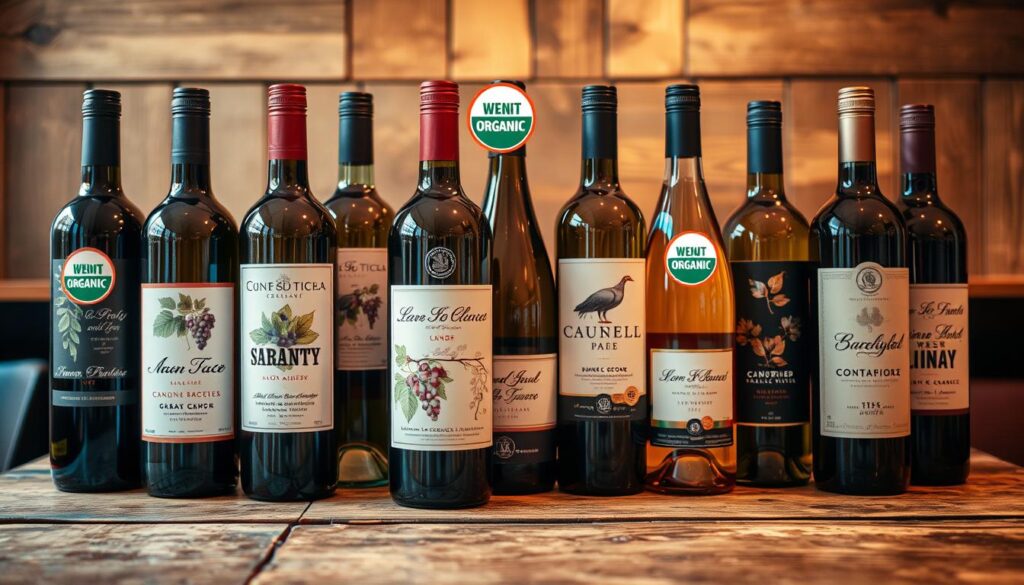
Understanding the journey of wine from vine to bottle is essential. Soil must undergo a three-year organic conversion before vines can be certified organic, reflecting a commitment to sustainable farming. This process showcases the dedication of producers to organic principles, including the use of natural fertilizers, manual harvesting, and avoidance of chemical treatments.
In 2022, sales of organic wine are expected to reach around 87.5 million bottles worldwide, emphasizing a growing consumer preference for certified organic wine. Familiarizing yourself with these organic wine labels and certifications enables you to confidently choose wines that meet your standards for quality and sustainability.
Where to Buy Organic Wine
Finding the perfect organic wine can be an enjoyable adventure. You may want to explore various options, including specialized wine shops, online retailers, and local farmers’ markets. The growing trend of organic offerings has even led to supermarkets and delivery apps including selections of organic wines. With numerous avenues available, you will surely have access to a diverse range of organic wines.
Best Places to Find Organic Wines
When searching for where to buy organic wine, consider these sources:
- Specialized Organic Wine Stores: These shops focus on organic and biodynamic wines, providing expert knowledge on their selections.
- Local Farmers’ Markets: Often featuring local producers, these markets are a great place to discover organic options directly from growers.
- Dynamic Online Retailers: Websites dedicated to organic products frequently have vast collections and can ship directly to your home.
- Supermarkets: Many grocery chains have started to stock organic wines, allowing for easy access on regular shopping trips.
Tips for Selecting Quality Organic Wine
To choose the best organic wines, keep these tips in mind:
- Familiarize Yourself with Regions: Certain areas, such as Napa Valley or Sonoma County, are renowned for producing quality organic wines.
- Consider Vintage: Some years produce better-quality wine due to favorable weather conditions, enhancing the flavor and character.
- Ask Knowledgeable Staff: Don’t hesitate to seek guidance from staff at wine stores—experts can offer invaluable insights based on your preferences.

| Source | Description |
|---|---|
| Specialized Wine Stores | Focused on organic selections, with expert staff to help you choose. |
| Online Retailers | A convenient way to browse various organic wines from home. |
| Farmers’ Markets | Direct access to local organic wines and producers. |
| Supermarkets | Growing availability of organic wines in mainstream grocery stores. |
Conclusion
In exploring the world of organic wine, you’ve uncovered a delightful fusion of quality, health, and sustainability. By choosing organic wines, you support a winemaking process that avoids harmful synthetic chemicals, resulting in a product that is not only better for your health but also friendlier to the environment. The benefits of organic wine extend beyond its rich flavors; they encompass a commitment to biodiversity, soil health, and eco-friendly winemaking practices, creating a positive impact on the planet.
As discussed, organic vineyards adhere to strict standards set by regulatory bodies like the USDA’s National Organic Program, ensuring that what you sip is genuinely organic. With fewer sulfites and no artificial additives, organic wines allow the unique terroir of the grapes to shine through, offering you a taste that is both authentic and complex. Every bottle reflects the careful cultivation and dedication of winemakers who prioritize environmental stewardship.
Embracing organic wine isn’t just about selection; it’s an invitation to engage in meaningful conversations about sustainability and conscious consumption. By being an informed wine lover, you’re championing eco-friendly winemaking and making a choice that supports healthier lifestyles and a healthier planet. So, the next time you raise a glass, consider the benefits of organic wine and the difference it makes, both in your glass and for the world.
